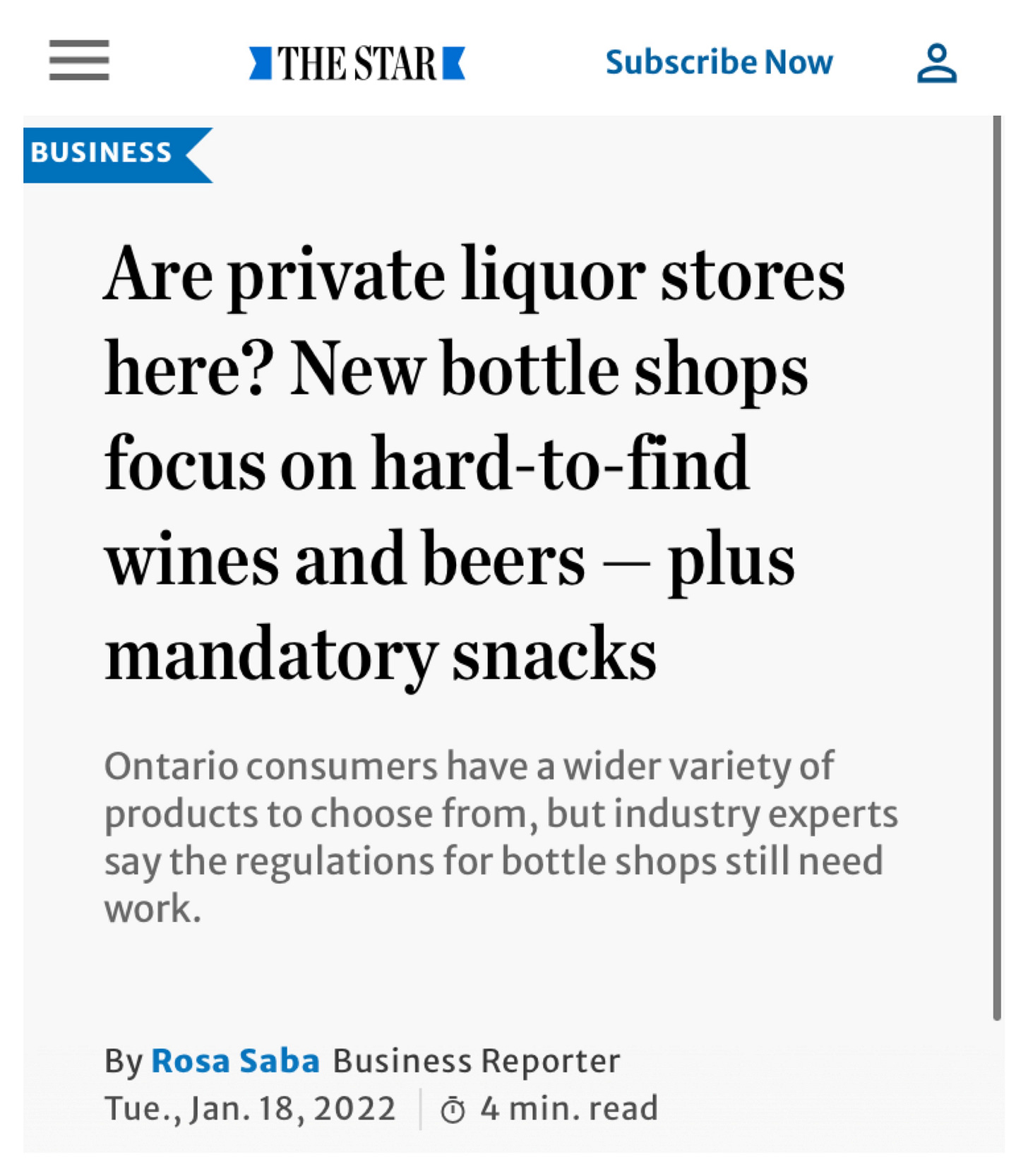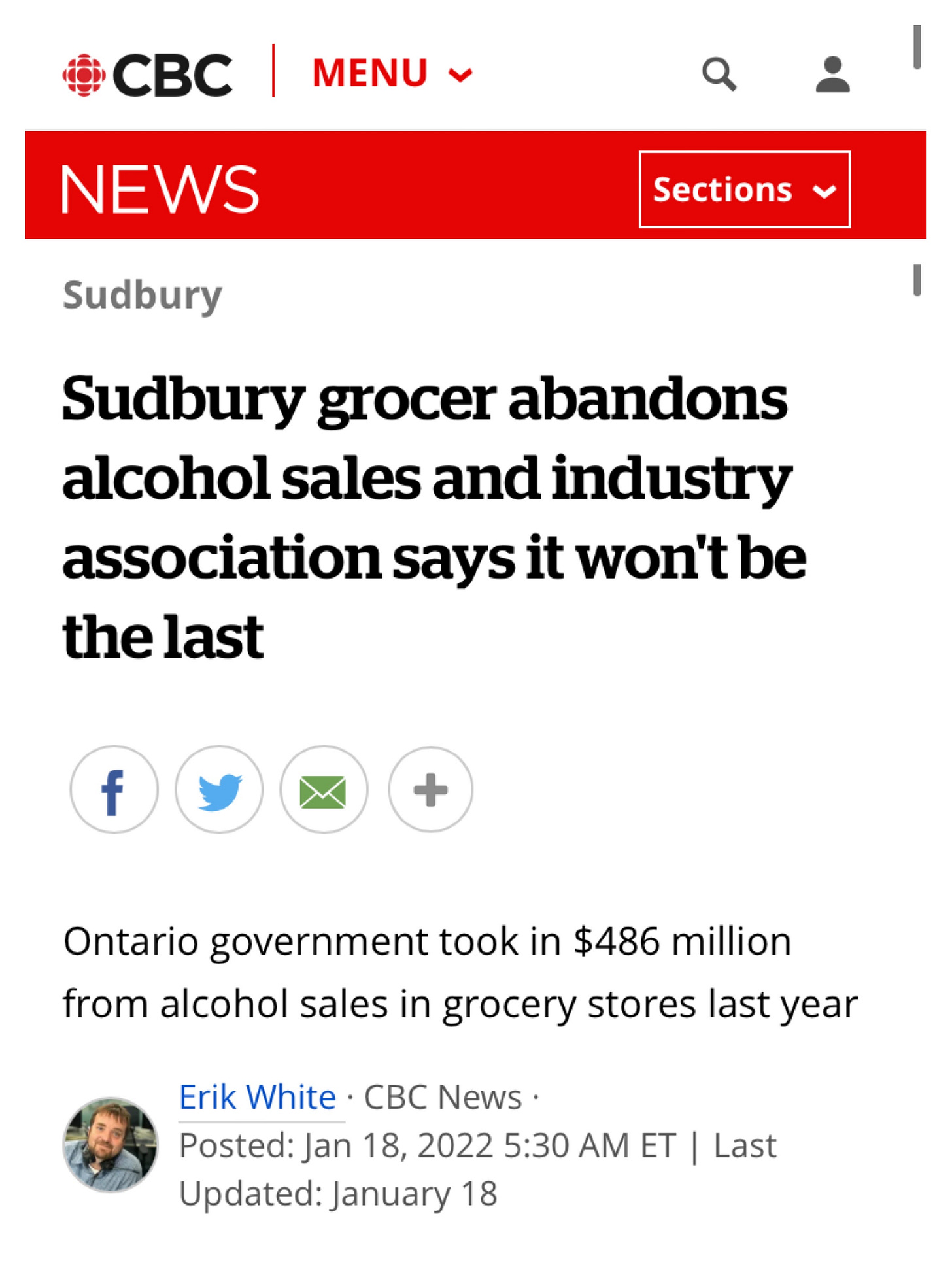Ontario's Wine Retail Landscape
Private-ish Wine Retail. In the Toronto Star’s Are private liquor stores here?, Rosa Saba writes about how Ontario consumers have more choice with new bottle shops. The Ontario government allowed restaurants and bars to sell wine to-go (with a snack), initially as a temporary pandemic measure, but now made permanent. The Star spoke to Benjamin Somers and Dan Grant of Bossanova, and Nicole Raufeisen of the Grape Witches, about the opportunities the new rules created; though the article notes that these bottle shops are operating “in a grey area,” and offers an important clarification:
But though places such as Grape Witches and Bossanova may look like retailers, legally, they’re not. There is no business licence designated for bottle shops. Ontario’s law regarding to-go alcohol sales is for restaurants and bars, not retailers. The bottle shop’s primary purpose still has to be as a restaurant or a bar…. But the appearance of these bottle shops doesn’t mean the province is out of the equation.
The bottle shops facilitate the sale on behalf of the LCBO, meaning that “the province still takes a cut of every bottle sold, regardless of who is selling it,” according to Sylvain Charlebois.
Jim Lisser of Drinks Ontario explains:
The LCBO is in charge of the logistics of importing, shipping, and pricing of alcohol brought in from outside of the province…. So the LCBO makes money on all the alcohol sold at a bottle shop, even if the same bottles aren’t on LCBO shelves.
Lisser refers to the LCBO as the “hub for all businesses selling alcohol,” and doesn’t think that will change, but that the rules “may evolve.” Both Somers and Raufeisen believe there will be further regulatory changes towards a truer retail model, while Charlebois added that:
Ontario has greenlit a pilot project for private alcohol sales in a province that has long been underserved for choice when it comes to alcohol retail.
For additional info on Ontario’s alcohol retail system, see What’s the Deal with Wholesale Pricing?
Ontario Grocers and Wine. Meanwhile, the CBC reported that the Real Canadian Superstore in Sudbury is abandoning alcohol sales “for reasons Loblaws has not disclosed.”
The Ontario government began allowing the sale of alcohol at some grocery stores — selected via a competitive bidding process by the LCBO — in October 2016.
In the CBC’s article, Gary Sands of the Canadian Federation of Independent Grocers (CFIG) explains that the competitive bidding process leaves stores with 1-2% profit margin on alcohol sales, a margin that may be offset if the purchase is made by credit card, due to interchange fees.
Continuing to sell this product at those margins is not sustainable…. The current system picks winners and losers. And right now, those that have a license are winners. So they might be losing on the margin, but they still have a license, so there's a real reticence there to walk away.
According to the article, CFIG is “asking the Ontario government to open up alcohol sales to all grocery stores and give them a bigger cut of the profits.”
LCBO’s 2020-21 Annual Report states that the grocery channel grew by 52% to $486.5 million in FY2021, which represents 6.8% of LCBO’s total sales of $7.18 billion, with the majority of sales (83%) coming from LCBO retail stores.
LCBO’s Move to Online Exclusives. A few months ago, WineAlign’s Buyers Guide included the update LCBO Announces Big Changes to the Retail Landscape for 2022, outlining LCBO’s plans to reduce the frequency of its in-store Vintages releases, which is moving to once a month instead of twice, with the second release to be available exclusively online. WineAlign explained that the “online exclusives will become the new sales channel for all of the new, odd, misfit wines.”
This spells the beginning of the end of in-store browsing for non-mainstream bottles. Wine lovers will now have to browse online to make their discoveries. The main problem I see with this in the sub-optimal LCBO website and especially the search engine, which makes finding products outside of the mainstream that are currently available a frustrating experience.
But WineAlign also reminded their readers about other ways to purchase wine in Ontario:
Bottle shops, wine clubs, and mixed cases of private imports direct from agents are all new to the landscape and great ways to explore.
Buying Local. In A thriving economy post pandemic means buying local, Silk + Coupe's Laura Milnes writes about how “buying local has finally garnered long over due support,” and provides suggestions for how consumers can support small businesses, some of which include:
Buy winery direct from wineries such as Lightning Rock, Creek and Gully, Whispering Horse, 16 Mile, and Traynor;
Buy from local importers who “vet for quality, price, and availability,” such as Drink Better, Vino Al Vino, Bespoke, and Plaid Cap Imports;
Subscribe to local wine clubs who “work in partnership with importers, retail shops and wineries” and do the “research and sourcing of the best, most exclusive, or highly allocated products” such as Crushable, Purple Teeth Consulting, and Somm at Home; and
Discover “virtual” wineries who purchase fruit from local vineyards and make small production wine in an existing winery, such as 80X Wine, plot, Thorn & Burrow, and Pamplemousse Jus.
And for a few more ways to buy local, there’s this newsletter’s sometimes updated A Guide to Drinking and Buying Natural Wine in Toronto.




